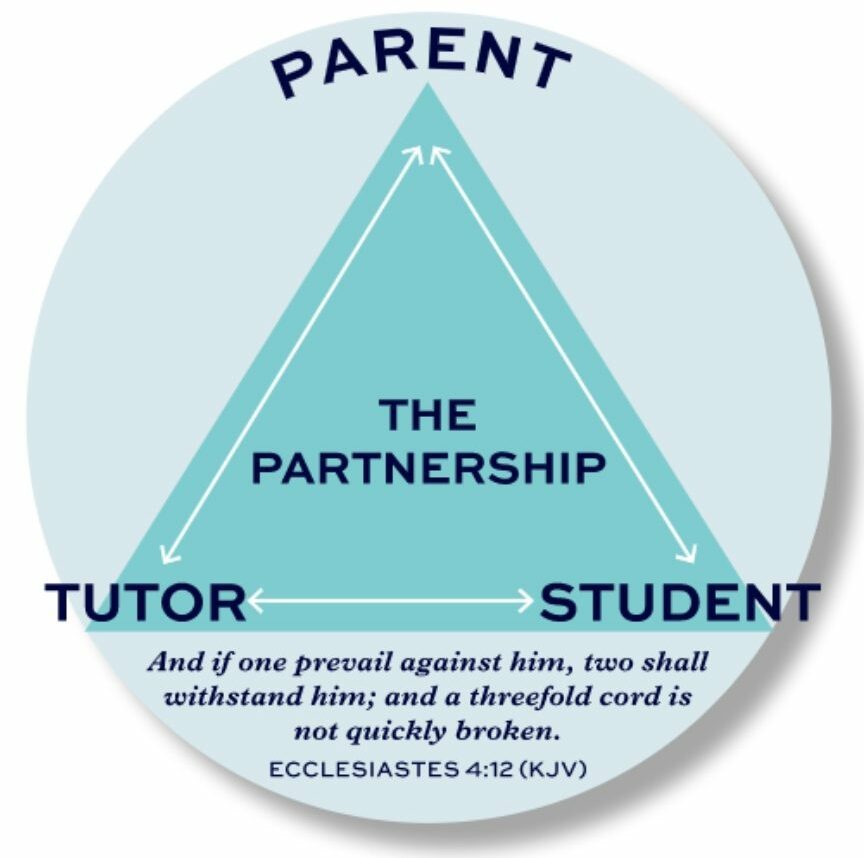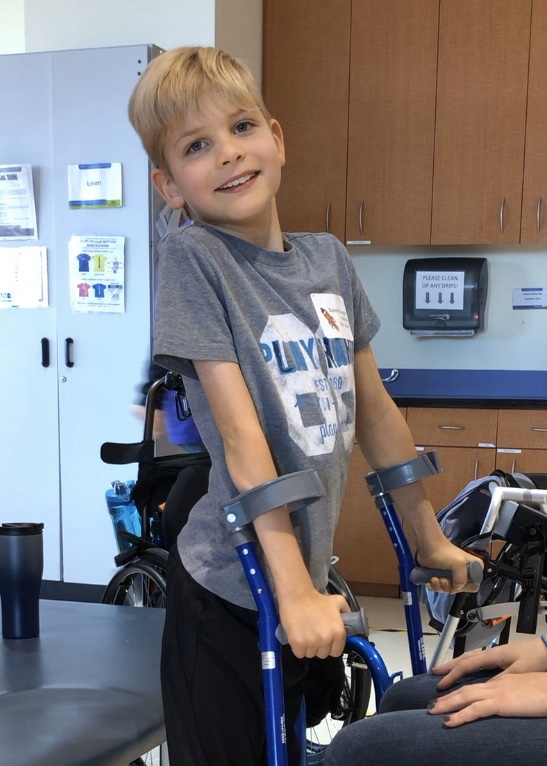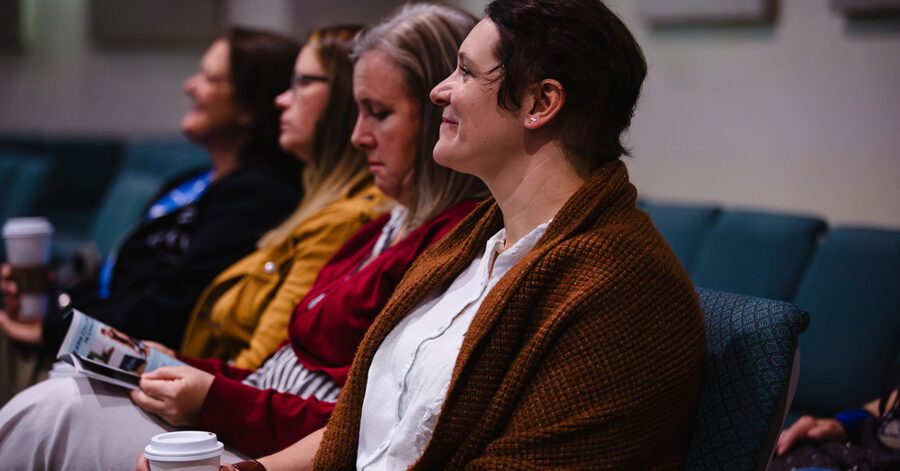Classical Conversations communities offer a place for families with special needs through genuine belonging and a homeschool community that sees every child as fearfully and wonderfully made.
Many families navigating learning differences, autism, ADHD, sensory processing challenges, or physical disabilities feel uncertain about the search for communities that genuinely understand neurodiversity while maintaining high academic standards. It can feel overwhelming—especially when you’re already juggling therapies, appointments, and the unique rhythms of homeschooling a child with special needs.
Christina Bottomly experienced this reality when her son Sebastian’s life changed overnight due to a rare form of polio. What she discovered was remarkable: their CC community didn’t retreat in uncertainty—they responded with Christ-like love through practical action.
This story reflects a broader truth across Classical Conversations communities nationwide. Families with special needs don’t just find accommodation—they discover belonging, practical partnership, and educational approaches that honor each child’s unique design while seeking to know God and to make Him known.
Finding a Homeschool Community to Fit Your Special Needs
The term “special needs” encompasses a broad spectrum of learning differences and challenges. Special needs encompass a broad range of conditions, including developmental delays, autism spectrum disorder (ASD), sensory processing disorders, speech and language impairments, physical disabilities, and more. From mild learning disabilities to significant developmental delays, from attention challenges to physical limitations, every child’s needs are unique.
Why Classical Education Works for Neurodiversity in Homeschool
What sets Classical Conversations apart in the special needs homeschool community landscape is its foundational belief that every child bears the image of God and deserves a beautiful education. This isn’t merely a philosophical statement—it’s a practical commitment that shapes how communities welcome families and adapt their approaches.
Classical education is for any student who desires to desire learning. The best classical schools understand that the point is not to teach just one type of student. An excellent classical school works to include and instruct every student. This principle is fundamental to CC homeschool communities, where the focus remains on cultivating wonder, wisdom, and virtue in every learner.
Unlike traditional co-ops that may view special needs students as requiring separate programs or extensive modifications, Classical Conversations communities embrace an inclusive model where children with varying abilities learn alongside their peers, each receiving the support they need to engage with the rich classical curriculum.
We Believe So We Build Community
The Parent-Tutor-Student Triangle in Action
The Parent-Tutor-Student partnership is a collaborative model that proves especially beneficial for families with special needs. In this partnership, parents remain the primary educators, Tutors help both parents and students sharpen their classical skills of learning, and students benefit from consistent, unified support.
For special needs families, this triangle creates multiple layers of understanding and advocacy. Parents bring intimate knowledge of their child’s learning patterns, triggers, strengths, and needs. They understand whether their child needs movement breaks, prefers visual or auditory processing, or requires specific behavioral strategies.
Tutors model classical pedagogy and content while remaining flexible in delivery methods. Every CC program level has an open-door policy for parents, and in Foundations and Essentials, parents must attend seminar with their students to learn from the Tutor and assist when needed.

Collaborative Accommodations in Classical Education
Collaboration between parents, therapists, and Tutors is essential to communicate specific, achievable goals tailored to each child’s abilities and challenges. As the parent and teacher, regularly assessing progress and adjusting strategies as needed will help you share the joy of lifelong learning with your student. This ongoing communication ensures that accommodations remain effective and evolve with the child’s changing needs.
The Parent-Tutor-Student partnership also provides consistency during community and at home. When a child struggles with writing due to dysgraphia, the parent can communicate effective strategies to the Tutor, who can then implement these during community day. The student experiences unified support rather than conflicting approaches, reducing anxiety and increasing confidence.
Most importantly, this collaborative partnership prevents the isolation that many special needs families experience. Instead of feeling like they’re managing challenges alone, parents find themselves supported by Tutors who view their child as a whole person, not simply a collection of deficits.
Christina’s Story: When Reality Meets Community
Christina Bottomly never expected disability to touch her family. “I felt I had already had my share of hardships and surely God would not add more,” she reflects. But when her son Sebastian contracted a rare variant of polio in 2016, their world shifted overnight.
Sebastian went from being “a highly energetic and athletic little boy to being barely able to turn his head.” The journey ahead would involve thousands of hours of therapy, over 400 nights in hospitals, and more than a dozen major medical procedures. Today, he walks with forearm crutches and continues fighting for recovery while still praying for complete healing.

 .
.

Community Response to Special Needs Families
During this overwhelming season, Christina discovered the true nature of community. “Most people withdrew from us. No one knew what to say, and honestly, there’s nothing they could have said that would have been right,” she shares. “But our CC family responded with few words and a whole lot of action.”
The practical support came in countless forms: CC moms took her other children sledding, brought meals, sent care packages, and opened their homes so her older daughter Reagan wouldn’t study alone. When Christina, a Challenge B Tutor, worried about failing her Challenge B students due to Sebastian’s medical needs, the parents prayed over her and thanked God for her influence in their children’s lives. Her Local Representative took over Mock Trial when she went into early labor just two days before the trial date.
Long-term Classical Conversations Special Needs Benefits
But perhaps most significantly, Classical Conversations provided educational stability during chaos. When they traveled for medical treatments, other CC communities offered housing and logistical support. The consistent content, structure, and pedagogy between communities gave them stability during ongoing crises. When they relocated to access better care, they found instant connection through shared CC culture.
“Now that my daughter’s studies have taken her far from home, she has found instant friends when she runs into CC graduates, even when traveling as far as Switzerland, England, Germany, and Rome,” Christina notes. “She has only to intonate ‘In 800 AD…’ and scan for the looks of recognition to find members of her extended CC community.”
Christina’s story illustrates how special needs support of Classical Conversations extends far beyond classroom accommodations—it creates lasting community that follows families wherever life leads them.
Practical Accommodations in Classical Education
Classical education’s structured, multi-sensory approach naturally accommodates many learning differences, but specific accommodations can enhance access for students with various needs. The key lies in maintaining the integrity of classical methodology while adapting delivery methods.
Learning Disabilities and Dyslexia Support
For students with learning disabilities like dyslexia, parents can implement several practical strategies at home.
- Allow students to learn content from audiobooks while reading along with print versions.
- Utilize CC Connected audio versions of Foundations memory work
- Challenge programs balance assessing students’ knowledge through oral and written assignments. Adjust assignments to fit your student’s needs.
- Challenge Tutors will often take pictures of board notes from class conversations. Look for these notes to help continue the discussions during the week.
- Tailor student assignments to include oral dictation or abbreviated writing assignments based on student ability.
The classical emphasis on oral recitation and discussion particularly benefits these students, as it allows them to demonstrate knowledge and engage with content without the barrier of written output.
ADHD Accommodations in Homeschool Community
Accommodations work best when they are tailored for the individual needs of the student based on the severity and symptoms of their ADHD and any other co-occurring conditions. For students with attention challenges, CC Tutors can provide:
- Preferential seating near the Tutor to avoid distractions
- Using a variety of movement techniques to engage students with Foundations new Grammar
- Five-minute warnings before transitioning between activities
- Posted schedules and clear routines
- Movement breaks between strands
The structured nature of CC’s classical approach actually supports ADHD students by providing predictable routines and clear expectations. The variety within each Foundations class—from new grammar to fine arts to memory work review—keeps attention engaged while building knowledge systematically.
Autism Support in Community
Students on the autism spectrum benefit from the predictable structure classical education provides, but may need additional support strategies:
- Visual timers to help with transitions
- Multisensory instruction that engages various learning channels
- Speech-to-text software or parent scribing for written work
- Peer buddy systems for social navigation
- Provide advance notice of sensitive subjects and the opportunity to opt out
- Immediate and frequent positive feedback
- Provide reassurance of the student’s safety, especially in triggering situations (loud noises, approaching storms, etc.)
The classical model’s emphasis on routine, clear expectations, and incremental skill building creates an environment where autistic students can thrive. Many find comfort in the predictability of memory work and the logical progression of grammar concepts.
While CC communities are eager to support families in creating positive learning experiences, parents remain the primary advocates for their child’s specific needs and work collaboratively with tutors to determine what accommodations are feasible within the community setting.
Sensory Processing and Physical Disabilities
For students with sensory processing challenges or physical disabilities, accommodations focus on environmental modifications and adaptive instruments:
- Noise-reducing headphones during large group experiences for sensitive students
- Fidget items that don’t distract other learners
- Flexible seating arrangements
- Modified fine arts activities
- Adaptive writing instruments or alternative recording methods
- Close collaboration with parents to understand specific triggers and helpful strategies
Physical disabilities require individualized approaches based on each student’s abilities and needs. The key is working closely with parents to identify practical solutions that maintain learning objectives while accommodating physical limitations that are attainable within the community.
Read How to Develop a Brilliant Memory
Loving Our Neighbors: Building Inclusive Communities
Christ calls us to love our neighbors as ourselves, and in Classical Conversations communities, this biblical principle shapes how we welcome and support each family. When we foster an inclusive environment that embraces all learners—regardless of ability level—we reflect God’s heart for His people and create communities where everyone can flourish.
Creating Inclusive Special Needs Homeschool Community Culture
Classical Conversations communities can foster this inclusive environment by:
Modeling Biblical Truth About Human Value: Every person, regardless of ability level, bears God’s image and contributes uniquely to the community. This fundamental truth shapes how families approach differences and challenges stereotypes.
Promoting Natural Integration: Rather than segregating students with special needs, CC communities emphasize natural inclusion where children with varying abilities learn side by side. This builds empathy, reduces fear of differences, and creates lasting friendships.
Celebrating Diverse Strengths: Some students excel at memory work, others contribute artistic talent, and still others bring unique perspectives to discussions. Communities thrive when they recognize and celebrate these diverse contributions.
Building Empathy Through Neurodiversity in Homeschool
Modeling Grace and Patience: Parents get overwhelmed with loud noises, stressed out, confused over social expectations, just like their kids deal with, but hopefully, they have better coping abilities. Anticipate that and treat people with grace. When communities model patience and understanding, children learn to extend the same grace to their peers.
Practical Classical Conversations Special Needs Resources
CC communities can enhance their special needs support by:
Parent Orientation and Communication: During Parent Orientations, Tutors should discuss potential accommodations and how they might impact all students, such as whether a student will be using a wheelchair or whether a hearing-impaired student might have a mom signing to him during New Grammar. This proactive approach will reduce anxiety that might arise from other children and will build understanding among families.
Resource Sharing: Experienced families can mentor newcomers, sharing strategies, resource recommendations, and encouragement. This peer support often proves more valuable than professional advice.
Flexible Participation: While Foundations and Essentials families will attend community day with their special needs child, Challenge parents may also be a part of community day to provide guidance without disrupting others’ learning. Communities should embrace this partnership model.
Understanding the Whole Family: Realize that special needs kids probably have special needs parents. Odds are that if a child has ADHD, his parent may have ADHD as well. Supporting the whole family creates stronger community bonds.
The Journey Continues
Classical Conversations communities offer something rare in educational settings: a place where academic excellence coexists with genuine belonging.
For families navigating special needs, the journey begins with prayerful discernment about whether CC community aligns with your child’s learning needs and your family’s educational goals. While communities are eager to support families and work collaboratively on feasible accommodations, parents should thoughtfully evaluate if the classical model and community structure will serve their child well.
Every child deserves access to truth, goodness, and beauty, and for many families, Classical Conversations communities provide that access wrapped in community love, practical support, and the unwavering belief that each child can grow in wisdom and stature.
The path may require adaptations, patience, and creative problem-solving, with parents working together within realistic boundaries. When there’s a good fit, the destination remains the same: young people equipped with knowledge, virtue, and the confidence to serve God and others with their unique gifts.




